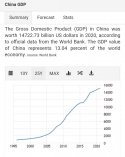How come the Japanese consumers could keep on buying stuff with so much money printed?You get a zombie economy. With zombie companies.
It sucks productivity from the real economy
You basically become another Japan
You are using an out of date browser. It may not display this or other websites correctly.
You should upgrade or use an alternative browser.
You should upgrade or use an alternative browser.
Chinese Economics Thread
- Thread starter Norfolk
- Start date
To be honest now that I'm working for a Japanese company I feel the notion of Japan being zombiefied is overstated. A more accurate example of a zombie economy would be Brazil. Japan is still very powerful in semiconductors, chemicals, retail, shipbuilding, commercial aircraft, automobiles and a lot of shit.How come the Japanese consumers could keep on buying stuff with so much money printed?
bajingan
Senior Member
Can i ask you a question if you don't mind?, since you work in a japanese companyTo be honest now that I'm working for a Japanese company I feel the notion of Japan being zombiefied is overstated. A more accurate example of a zombie economy would be Brazil. Japan is still very powerful in semiconductors, chemicals, retail, shipbuilding, commercial aircraft, automobiles and a lot of shit.
This youtube video explained how deflation in japan really have a negative effect on the overall health of the economy
If japan had such powerful high tech industries, how come the average salary of japanese is lower than other industrialized nation?
And how come as this video explained japanese companies are really reluctant to raise prices of their products even if just a little?
Is this really the effect of the economic surrender (plaza accord) that japan signed?
Well the video seems like a clickbait one.Can i ask you a question if you don't mind?, since you work in a japanese company
This youtube video explained how deflation in japan really have a negative effect on the overall health of the economy
If japan had such powerful high tech industries, how come the average salary of japanese is lower than other industrialized nation?
And how come as this video explained japanese companies are really reluctant to raise prices of their products even if just a little?
Is this really the effect of the economic surrender (plaza accord) that japan signed?
I mean yes perhaps the well known business to consumer Japanese companies like Fast Retailing (Uniqlo), Toyota compete on low prices. But there are high value added Japanese companies that don't worry much about price competitiveness, like Hitachi Elevators, HondaJet, Mikimoto, Mitsubishi Chemicals. These are business to business and they aren't as well known to the layman.
EDIT: Oh and the Okamura desk chair I'm sitting on too is pretty price differentiated
Japan is also big in the timber industry and fragrance industry.
Last edited:
Thats the mistake that the chinese leaders are doing now. They have to understand that the chinese economy cant continue to grow at high rates, and that it will have to desacelerate.The mistake would be to carry on regardless. That is what Japan did in the late 1980s: investors priced in continued economic growth of 8 per cent a year, when such a level was no longer remotely achievable. It ended, inevitably, in disaster. The longer China hesitates to learn that hardest lesson, and accept a lower level of growth, the greater will be its ultimate pain.
No, it shouldnt. A target for gdp growth creates missalocation of resources and economic waste. They should just scrap it.A target for gdp growth should definetely be maintained.
And you know better than them?Thats the mistake that the chinese leaders are doing now.
How do you have any standing to call what Chinese leaders are doing a "mistake"?
I'll remind you that since you've been here, China's economy has tripled in size. First, how do you feel about that fact? Second, what makes you think you have any advice to give to a government that's delivered such performance, or even that your opinion on such a government is worth considering?No, it shouldnt. A target for gdp growth creates missalocation of resources and economic waste. They should just scrap it.
Another interesting fact is that since 2010, Portugal's economy hasn't grown at all. What are you doing giving China economic advice? Physician, heal thyself.
No, it shouldnt. A target for gdp growth creates missalocation of resources and economic waste. They should just scrap it.
Please provide evidence for this claim.
The US wished it had such a "missalocation of resources and economic waste"
View attachment 78680
Chinese GDP (14.72 trillion USD) represents 17.4% of global GDP (84.54 trillion USD) in 2020.
That's because Japan still has trade surplus, and major Japanese companies still make enough money in their huge oversea investment to remit profits back to Japan. More importantly, Japan elderly who control and accumulated most of the wealth due to the boom years have kept their savings and didn't overspend which result in deflation pressure instead of inflation pressure within Japan.How come the Japanese consumers could keep on buying stuff with so much money printed?
For Japan, the issue is its gigantic government debt which at the moment even with ultra low interest rate still eats up a major portion of Japanese government budget. Japanese government and central bank need to simultaneously keep its bond interest rate low and jump start inflation in order to avoid economic crisis.

